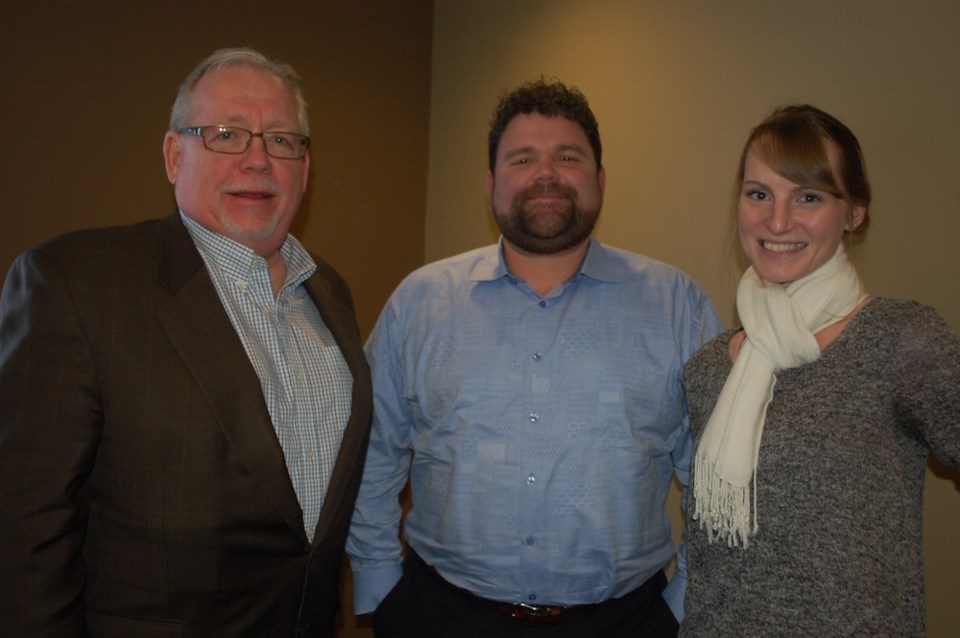Editor’s Note:
The Mercury agreed to an unusual request to not formally record the otherwise public meeting conducted by #TransformSk which meant that statements noted below could not be attributed to any group or individual following a general introduction by Steve McLellan of the Saskatchewan Chamber of Commerce.
Rather than make the decision to leave the meeting room it was determined that gathering some general information about the context of the event was preferred rather than not gaining any knowledge about what was going to be under discussion and debate on topics the Mercury feels were of importance.
With that in mind, the following news article was filed:
A trio of facilitators representing five provincial sponsoring associations led a free-flowing discussion on provincial issues with a group of about 30 local and regional business, industry and community builders in the conference room at the Microtel Inn on the afternoon of Dec. 9.
Although the meeting was unrecorded, Megan Jane, executive co-ordinator for the Saskatchewan Construction Association, took notes that will eventually become part of a multi-faceted report and recommendations that will be returned to the participants and then filed with the Government of Saskatchewan and the Official Opposition.
“This report and the recommendations need to be different from government consultations that are taking place regarding transformational change coming to Saskatchewan,” said Steve McLellan, CEO of the Saskatchewan Chamber of Commerce who joined Mark Cooper, president and CEO of the Saskatchewan Construction Association, and Jane as facilitators. “That is why we are not funded by government in any way,” he said.
The sponsoring bodies included the two aforementioned associations as well the Saskatchewan Manufacturing Council, Saskatchewan Mining Association and the Agriculture Producers’ Association of Saskatchewan.
Working from a three-point questionnaire, designed to provoke further discussion, community participants talked about what they felt could be done differently or what could be added to the province to evoke positive change and growth.
It was a unique opportunity to discuss what they could do differently and what and who needed to be involved.
The wide-ranging topics dealt with such issues as energy and the future of coal, oil and uranium as fuels of the future within the resource-based province.
Other issues focused on real estate, social services, special interest groups, taxation levels, export avenues, labour, First Nations education and entrance into the labour force, aging infrastructure and weaknesses in the current provincial education system at the elementary, secondary and post-secondary levels.
The promised federal government imposition of a carbon pricing system, consumed about 20 minutes of discussion.
There were several concerns expressed about exactly what the provincial government is using as a benchmark for transformational change.
It was interesting to note that most of the discussions and suggestions did not involve a call for increased provincial government spending, but rather making changes to various industries and organizations to make them more efficient and readied for further growth.
Some unattributed comments included a need to get away from the cycle of judgment, changing Saskatchewan’s image with the rest of Canada, making cuts in services not being an answer to curbing the deficit and debt and further investment in global businesses.
The discussions included mental and emotional health and handling current stress factors among business leaders and employees in today’s Saskatchewan and what could be done to not only attract skilled immigrants, but to also provide incentives for them to stay in Saskatchewan.
There were concerns of federal regulations being imposed on Canadians with regards to the promised carbon pricing (tax) and the legalization of marijuana that is moving ahead without proper consultation or planning.
Short discussions focused on e-commerce and how online services are developing a new era of business people who are thinking differently and whether a new age of less accountability in business and educational fronts were going to make positive or negative changes to the business environment.
There was also an exchange of suggestions regarding tourism and how the province may be failing in that category, which translates directly to business success.
There was talk about the need to lure more managers and executives to the province and then how to deploy them in the smaller centres outside Regina and Saskatoon.
There was agreement in the room when it came to building on the province’s resource strengths, and how to engage both private and public investment through easing of regulations and royalties. Filling the high quality technical jobs, is going to continue to be a challenge, the delegates figured, but they were needed if industries were going to build here or renew their operations.
At that point the discussion circled back to education needs and the importance of placing educators in charge of future curriculum development.
After a few minutes more of discussion on the need to grow the educational component in Saskatchewan, an adjournment was called with the promise that the recommendations would come back to the local participants before being filed with the provincial government and opposition.
The meeting in Estevan was Number 19 in an extended schedule that calls for a total of 35 meetings to be held across the province.



